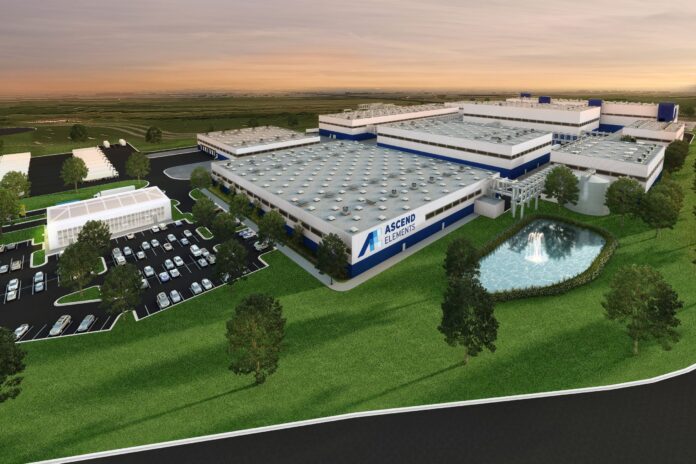The lithium-ion battery recycler won’t make cathode active materials at its new facility, but it will produce cathode precursors and lithium carbonate.
Ascend Elements, a leading contender in advanced battery recycling, canceled a portion of its planned battery-materials plant last week. The company still aspires to expand a fully domestic battery supply chain but has had to adapt to tumultuous policy and market conditions.
China controls most of the world’s processing capacity for key battery inputs. Under the Biden administration, the U.S. began a concerted effort to build up those resources — like lithium mines, lithium-processing plants, and advanced facilities that make cathode active materials (CAM) that go into batteries.
A cohort of battery-recycling startups joined the cause, pledging to safely and economically disassemble old batteries and funnel their pieces back into the supply chain. Ascend is one of them: The Massachusetts-based company opened a plant in Covington, Georgia, in March 2023 that grinds up used batteries into the powder known as black mass. Ascend is currently building a plant in Hopkinsville, Kentucky, where it will refine that black mass into battery materials.
That project, called Apex 1, is still happening, but Ascend has narrowed its scope: The startup announced last week that it is scrapping plans to produce CAM there and agreed to cancel the $164 million grant that the project won from the Department of Energy. Ascend intends to convert the space that would have made CAM into a lithium carbonate production line, using a proprietary technology the company rolled out at its Covington plant early this year.
Apex 1 will still produce the precursors to CAM known as pCAM, an effort aided by a separate $316 million grant from the DOE. These powders include cathode materials like nickel, manganese, and cobalt; manufacturers add lithium to those ingredients and fine-tune the recipe to generate finished CAM.
Between the previously planned pCAM and the newly announced lithium carbonate lines, Ascend still plans to invest about $1 billion in the Kentucky project, spokesperson Thomas Frey told Canary Media on Tuesday.
The companies that buy CAM already have supplies lined up, and demand isn’t growing fast in the near-term, Frey said. But the companies that make that CAM need to obtain the precursor materials from somewhere, and that’s where Ascend still sees an opportunity.
“By getting out of CAM, we’re essentially turning potential competitors into potential customers,” he said.
Ascend can sell its pCAM to specialized CAM manufacturers or to electric-vehicle and battery manufacturers who want their suppliers to use that particular material, Frey noted.
“We’re still really highly committed to creating a domestic, closed-loop battery ecosystem in the U.S.,” Frey said. “We will be the only large-scale manufacturer of pCAM in America. With tariffs at play and things like that, that makes us pretty appealing.”
Another benefit to focusing on pCAM is that it’s a more generalizable product than CAM, which has to be tailored intricately to each battery manufacturer’s proprietary designs. Since batteries are such a precisely calibrated technology, prospective buyers scrutinize CAM samples for a year or more before clearing producers for a large commercial order. The sales cycle for pCAM is quicker and easier, Frey said.
Ascend’s timeline has also been influenced by a broader slowdown in the U.S. electric-vehicle manufacturing buildout. Detroit automakers have pulled back on their earlier enthusiasm for EV production, which has pushed back timelines for the battery supply chain, including CAM and pCAM.
Some companies have canceled battery factories in just the last few weeks, like Freyr Battery (now T1 Energy), which had aspired to build one in Georgia, and U.S. startup Kore Power, which ditched plans for a facility near Phoenix.
Ascend has extended its timeline for Apex 1 from the end of 2025 to the third quarter of 2026, which Frey said allows for a more cost-effective construction process. Commissioning is underway for the new lithium carbonate line at Ascend’s Covington factory, which should begin commercial production in the next few months, he added.
The Covington plant has also struggled with a more fundamental problem: The old batteries the facility grinds up keep catching fire.
Firefighters responded to a Feb. 20 conflagration in a tractor trailer delivering used batteries to the site. The fire consumed the trailer but did not jump to the adjacent building, per local news reports from the scene.
Jarringly, that was the 14th time Ascend’s Covington plant called in emergency teams. Not all those calls included outright fires, and nobody was injured in any of them, plant manager Andrew Gardner told WSB-TV. But the track record has the city’s mayor worried about the safety of hosting such a facility in the community.
Some of those calls involved workplace injuries and concerns unrelated to lithium-ion batteries, Frey noted to Canary Media. Nonetheless, the latest incident was the biggest thermal event so far; it destroyed the trailer and left some burn marks on the exterior of the nearby building but did not enter the structure. The cause seems to have been batteries that were not properly packed or discharged prior to shipping.
“Since then we have gone on a blitz with all of our customers to redo training on how to pack end-of-life batteries and scrap,” Frey said. “We’ve stopped operations for 10 days to work really closely with the Fire Department and the mayor to show them we’re doing everything we can to ensure safety.”




